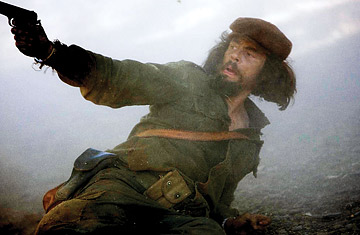
Benicio Del Toro in Che.
(2 of 2)
The dyspepsia of Del Toro's performance is partly due to the bromides he has to enunciate — that the most important quality of a revolutionary is "love," and that he's not a Catholic but "I believe in mankind" — and partly because so little information is vouchsafed about his non-jungle career or his private life. (You're about 100 mins, into Part One before Che mentions in passing that he has a wife and child back home.) Halfway through the film he has lost much of the power and poignancy you might expect of such a character, and by the end he's relinquished all our interest. After all that time spent with the revolutionary leader, the viewer still may ask, "So, who is this guy?"
As Roger Ebert put it: "No attempt is made to get inside the mind of this complex man, Guevara. We are told he was a medical student, suffered from asthma, was more ruthless than Castro, was the real brain behind the operation. Big deal. ... When we aren't getting newsreels, we're getting routine footage of guerrilla clashes in the jungle. ... All this movie inspires toward the Cuban Revolution is excruciating boredom..." He wrote this in 1969, in a review of the flop Hollywood bio-pic Che!, with the not-very-Latin Omar Sharif as Guevara. Yet most of Ebert's denunciations apply to Soderbergh's movie, which dispenses with the exclamation point — and, in fact, with almost all of the compelling, sometimes contradictory drama in Guevara's life.
VIVE QUENTIN!
Before a packed house at the 800-seat Debussy Theatre, Tarantino bounds onstage with the sort of animal and intellectual energy seen in few films here this year. Without much prodding from Ciment, he pinwheels opinions, more or less praising the new flop movie Speed Racer (bravo, brave Q.T.!), and railing against film composers, coming in at the last moment to "save" a film with their intrusive underscoring: "Who the f--- is this guy, throwin' his sh-t over my movie?"
He was sharpest in recalling his early days, when a film lover had no video store to serve as his library-cinematheque. Instead, he said, "I'd get the TV Guide every week, go through [the movie listings] cover to cover, circle the films I was going to record." Later he famously worked at Video Archives in Manhattan Beach, Cal., but that was only part, and not the crucial part, of his film education. "Everything I learned about writing I got from acting class." James Best, a longtime film and TV actor (Sam Fuller's Verboten!, Budd Boetticher's Ride Lonesome and Ray Kellogg's The Killer Shrews, to pick only from his work in 1959), taught a class called Camera Technique: how to act in movies. "He started teaching me the vocabulary of the camera." That was the beginning of Tarantino's rise to becoming a writer with camera movement and actor's behavior as well as the wild dialogues that get all the attention in his movies.
Just before he was to make Reservoir Dogs, he took part in a directors' workshop at the Sundance Institute. He shot a long-take dialogue scene and showed it to three veteran directors; they all thought it stank, and one cinematographer told him, "Not only is this scene horrible, the most frightening thing is that you're going into production." The next week, a new group of directors came in; this time there were raves for the same scene. Terry Gilliam offered encouragement, and Volker Schlondorff said, "Ah, da little genius!" Tarantino says this taught him an important lesson: "People are gonna really like my stuff or really not, so get f---in' used to it."
By now, the world is used to Tarantino's stuff, and most of the time can't get enough of it. (Now he's working on a World War II epic.) But in the back of his head is the grudging ambition of the outsider, the movie geek, the 45-year-old fanboy. He still feels defiantly out-of-step; while every other director is going digital, Tarantino says, "I go backwards. It's lower-lower-lower tech for me." More than once today, he confided what he once felt and may still feel: "They don't let people like me make movies."
They ought to. Indeed, considering the vapid quality of films these days, at Cannes and beyond, they ought to make him make more movies.
